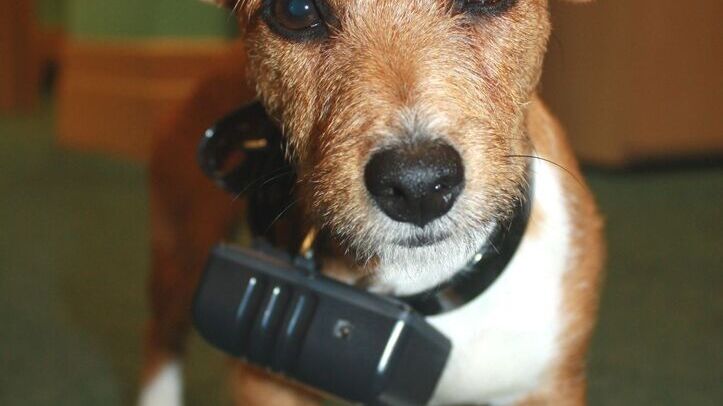The Government has laid legislation which will completely ban the use of hand-held remote-controlled electric shock collars in England, to take effect from February 1, 2024.
Shock collars deliver an electric shock to a dog’s neck via a remote control, and shocks can last for up to 11 seconds at a time within a radius of up to two miles. As many as 5% UK dog owners reportedly use them.
The legislation follows a public consultation on the devices, which concluded in 2018. Shock collars were banned in Wales 13 years ago and in France from January 2023, while in Northern Ireland, the Code of Practice for dogs advises against the use of aversive training methods such as electronic, spray and prong collars. The Kennel Club welcomed the announcement, after running a 10-year campaign to ban the devices, including co-hosting a drop-in session for Scottish Parliamentarians with MSP Christine Graham and the Scottish SPCA hoping to persuade MSPs to enact a similar ban, after the Scottish Government’s guidance, condemning the use of shock collars in 2018, had been shown to be ineffective.
Mark Beazley, chief executive of The Kennel Club, said: “The legislation banning electric shock collars in England, which comes into force next year, is a historic moment for animal welfare and will put an end to the misery and suffering of countless dogs who are still subject to these cruel and unnecessary devices. There is simply no excuse for using these devices, which cause physical and psychological harm, especially given the vast array of positive training methods available.
“This is the culmination of over a decade of campaigning for us and we applaud Defra for helping to safeguard the welfare of our nation’s much-loved dogs. More action is urgently needed in Scotland, where regulations are needed to replace the ineffective guidance currently in place, and we will not rest until we see the complete ban on these devices that cause suffering and harm.”
Dog welfare charity Dogs Trust also welcomed the ban, pointing out that research has shown that instead of improving behaviour, the use of such devices can actually risk causing further problems.
The charity had hoped to see the proposed regulation go even further to include a ban on the sale and distribution of electric shock collars, and the use of electric shock containment systems and other aversive training devices. As well as the collars risking physical injury, the charity pointed out that dogs may not associate the shock with anything specific and become anxious about the wider situation where the collar is used. As a result, they may avoid going for walks, be very inactive on walks, stick close to their owner through anxiety or become aggressive towards their owners either in immediate response to the pain, or to avoid further shocks when the collar is put on.
Dr Rachel Casey, director of canine behaviour & research at Dogs Trust, said: “We welcome today’s announcement from Defra that hand-held electric shock collars are to be banned in England. It is both unnecessary and cruel to use these collars on dogs.
“Research has shown that electric shock collars negatively impact dog welfare and instead of improving behaviour, risk causing further behaviour problems. Worse still, they can be a mechanism for abuse if used in anger.
“We care for over 14,000 dogs every year, many of whom work with our team of qualified behaviourists, and we know that positive reward-based methods are as effective without causing harm to dogs.
“We ask Defra to look again at banning the sale of electric dog collars and banning other aversive training devices such as electric shock containment systems. There is no place or need for these cruel devices in modern dog training.”



